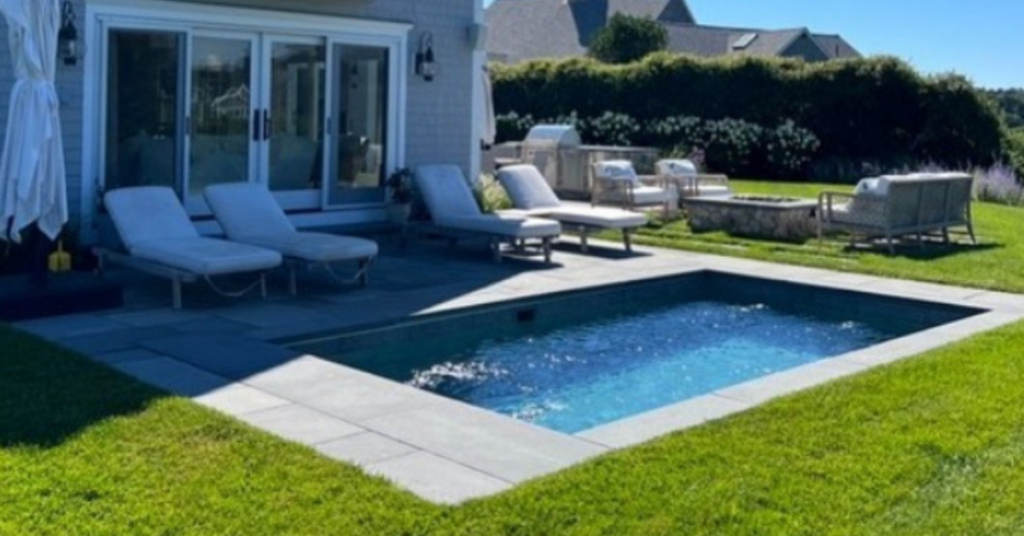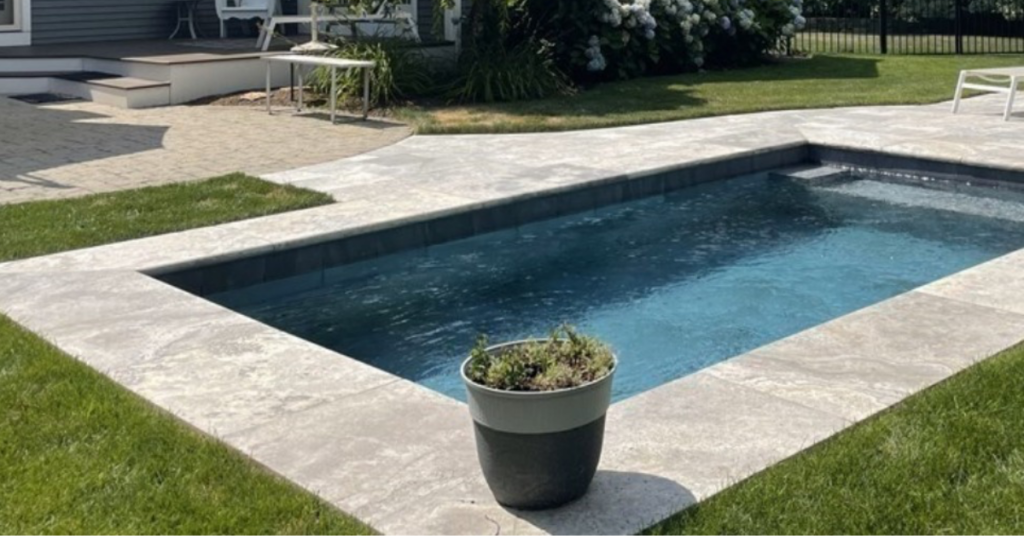Plunge Pools vs. Traditional Pools
The appeal of having a personal oasis in your backyard has led many homeowners to contemplate installing a pool. However, making the right choice can be challenging with various options available.
Two popular choices are plunge pools and traditional pools. Both offer different features and benefits, catering to different lifestyles, needs, and budget requirements.
In this guide, “Plunge Pools vs. Traditional Pools,” we’ll dive into the characteristics, advantages, and considerations of each to help you decide which type of pool suits your needs best.
Plunge Pools

Plunge pools have gained popularity recently, especially among homeowners with limited space or those seeking a more intimate pool experience with less maintenance.
Here’s a closer look at what plunge pools entail.
Size and Space
Plunge pools are typically compact, ranging from 13 to 21 feet long and 7 to 9 feet wide. Their smaller footprint makes them ideal for small backyards or urban settings with limited space.
Hydrotherapy and Relaxation
Despite their smaller size, plunge pools offer therapeutic benefits. With heaters installed, plunge pools relax sore muscles and joints, making them popular for hydrotherapy and wellness. Some models come equipped with jets for added massage functionality. In addition, some models can be easily converted from a cold to a hot pool.
Energy Efficiency
Due to their smaller volume of water, plunge pools require less energy to heat and maintain, resulting in lower operational costs than traditional pools. This makes them a more sustainable option for eco-conscious homeowners.
Customization Options
Plunge pools come in various designs and configurations to different aesthetic styles and space constraints. They can be integrated seamlessly into existing landscapes or custom-built outdoor living areas, such as patios or decks.
Plunge Pool Concepts, a leading plunge pool dealer, offers two types of plunge pools, precast and composite, each with advantages.
The composite Quantum line of plunge pools is 200 times stronger than traditional pools while 30% lighter, making them an excellent alternative to traditional concrete pools.
On the flip side, the Plunge Plus line of precast pools is constructed with high-end RENOLIT® reinforced textured PVC for a smooth interior.
Traditional Pools
“Plunge Pools vs. Traditional Pools.” Now, let’s discuss the traditional pool.
Traditional pools have long been a staple of residential properties, offering ample space for recreation, exercise, and entertainment.
Let’s explore the features and benefits of traditional pools in more detail.
Size and Versatility
Traditional pools are larger than plunge pools, typically 20 to 40 feet long and 10 to 20 feet wide. This ample space allows for various activities, including swimming laps, water sports, and large social gatherings.
Regarding swimming laps, plunge pools can also be excellent for swimming as swim tethers can be installed to swim in place within the smaller pool.
Recreation and Entertainment
Traditional pools are synonymous with recreational activities and outdoor entertainment. They provide a venue for family fun, backyard barbecues, and poolside parties, making them an integral part of the summer lifestyle for many homeowners.
However, parties are undoubtedly fun with plunge pools, with just a few fewer people in the pool at once.
Design and Customization
With traditional pools, the design possibilities are virtually limitless. But do not get discouraged if you are considering a plunge pool. If you find the right plunge pool dealer, there will be abundant customization options.
Property Value
A well-maintained traditional pool can significantly enhance the resale value of a property. Many homebuyers view a pool as a desirable feature for appealing and enjoying the outdoor living space, potentially increasing the home’s marketability.
In contrast, a smaller plunge pool can be a better selling feature for many as buyers may prefer less maintenance and other lifestyle choices such as hydrotherapy and relaxation.
Considerations: Will It Be a Plunge Pool or a Traditional Pool
When deciding between Plunge Pools vs. Traditional Pools, several factors should be considered, including available space, intended use, budget, maintenance requirements, and style choices.
Both options offer unique advantages that can transform your backyard into a refreshing oasis for years. By carefully weighing the advantages and disadvantages of each type of pool, you can make an informed decision that aligns with your needs and enhances your outdoor living experience.
To learn more about Plunge Pools, contact Plunge Pool Concepts.



